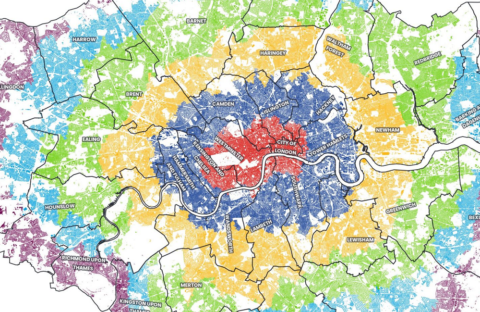Ed West wonders why the Brits come up with such boring names for, well, everything:

A detail from the Mapping London Tube Zones map – https://mappinglondon.co.uk/2021/tube-zones/
Back in the 1850s, when London was getting its first proper government, the authorities had a problem with street names – they were just so boring that it was actually confusing.
According to Judith Flanders’s The Victorian City: “In 1853, London had twenty-five Victoria Streets, thirty-seven King and twenty-seven Queen Streets, twenty-two Princes, seventeen Dukes, thirty-four Yorks and twenty-three Gloucesters – and that was without counting the similarly named Places, Roads, Squares, Courts, Alleys or Mews, or even the many synonyms that designated squalid backcourts: Rents, Rows, Gardens, Places, Buildings, Lanes, Yards and Walks. One parish alone had half a dozen George Streets.”
Bearing in mind how small London was at the time, no more than zone 1 and bits of zone 2, it’s quite impressive that they managed to have so many Victoria Streets. Impressive, and obviously stupid. The Metropolitan Board of Works forced parishes to rename duplicates; but even as the capital expanded, borough councils continued the practice, so that dozens of new Victoria roads and streets were created (many of which have since been changed).
Perhaps it reflects a deeply content and loyal public, but it’s more a testimony to how dull and unimaginative the British are about naming things. And it’s a fine tradition we continue today with the Elizabeth Line.
[…]
Although the new Elizabethans are in many ways the anti-Victorians – declinist, slow to get things built, filled with civilisational self-hatred – in our naming patterns we are recognisably the same people.
A few years back, when Britain launched its biggest ever warship, weighing in at 65,000 tons, they named it HMS Queen Elizabeth. This came after it was decided we needed a new name for our part of Antarctica – with huge originality, they went for “Queen Elizabeth Land”. Even Big Ben was renamed the Queen Elizabeth Tower in 2012.
The Queen, bizarrely, has twenty hospitals named after her, which led to a small revolt when the South Glasgow University Hospital became the latest. Considering how many brilliant scientists Scotland has produced, you might think they could have found someone else. Alexander Fleming, one of the alternatives suggested, grew up not far away in Ayrshire and saved literally hundreds of millions of lives.
Edward Jenner, meanwhile, has the Viale Edoardo Jenner in Milan named in his honour, and a town in Pennsylvania. While there is a Jenner Road in Stoke Newington, you wouldn’t necessarily know it was in tribute to the man who discovered vaccinations. That is because, when we honour someone with a street, the British shyly only feature their surname; the only time we follow the continental pattern of including the full name is, bizarrely, with local councillors. The people who run local government in Britain are not against honouring heroes in theory, they just think the real heroes aren’t explorers, scientists or military leaders, but the people who run local government.



